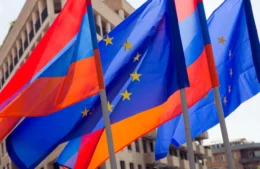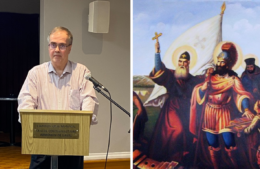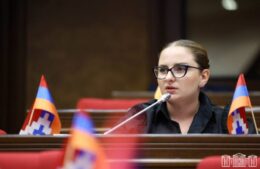Every time Pashinyan opens his mouth, he harms Armenia’s interests
- (0)

by Harut Sassounian
Every time Armenia’s Prime Minister Nikol Pashinyan makes a public statement, he ends up damaging Armenia’s interests.
The latest example of Pashinyan’s detrimental words is the 90-minute interview he gave to Armenia’s Public Television on November 22, 2024.
The first question was about how Pashinyan recently fired six top government officials by sending them a text message on a Sunday evening. The journalist asked why he fired them.
Pashinyan stated that their “dismissals are not personalized but are rather related to systems.” Nevertheless, he said that the fired officials “were doing a good job.” The journalist pointed out that the prime minister made no systemic changes but simply fired the individuals. He explained that these officials had made remarkable systemic improvements, but as time passed, they became part of the system. He went on to admit that “a similar thing happens to me too.”
The journalist, Tatev Danielyan, then questioned Pashinyan about his dismissal of the chairman of the Supreme Judicial Council Karen Andreasyan, “a body completely independent of the executive branch. It turns out that at the prime minister’s, so to speak, urging, he decided to submit a resignation letter. Now your opponents say, what is this if not pressure from one branch of government on the other?”
Pashinyan gave the unconvincing explanation that “there was no urging from the prime minister, there was a request from the prime minister.” The journalist responded, “There is a rupture between the statements and actions of the executive branch about an independent judicial system.”
There is no separation among the three branches of the government. Pashinyan single-handedly runs all three branches: the executive, legislative and judiciary. Anyone who deviates from his wishes is fired and replaced. Strangely, this man, who speaks about democracy day and night, violates the basic principles of democracy.
Pashinyan then made the mistake of saying the officials he “requested” to resign have two options: “fulfill the request and not to fulfill that request.” The journalist pointed out that if the officials refused to resign, there would be consequences. Pashinyan pleaded ignorance by asking, “What consequence?”
When asked if Pashinyan had consulted his advisors before firing the six officials, he proudly replied, “This was a one-person decision.”
The journalist then asked if Pashinyan had requested the resignation of Narek Zeynalyan, a member of the ruling parliamentary bloc. Pashinyan said yes. Zeynalyan resigned, but fellow parliamentary member Hovik Aghazaryan has so far refused Pashinyan’s “request” to resign. “I hope that my request will not remain unanswered,” Pashinyan said. Since that request, Aghazaryan has been interrogated several times by the authorities on suspicion of fraudulent activities. This is yet another example of the prime minister’s undue interference in the affairs of another branch of the government, the parliament.
Pashinyan also had a lengthy discussion about his persistent efforts to convince Pres. Ilham Aliyev of Azerbaijan to sign what he calls “a peace treaty,” despite the fact that Aliyev has not only shown no interest in signing such a document but has escalated his demands for further concessions from Armenia. Pashinyan does not seem to understand the difference between the signing of a piece of paper, which he calls “a peace treaty,” and actual peace.
However, the biggest gaffe Pashinyan made during his 90-minute interview was equating Aliyev’s demands for a fake “Western Azerbaijan” to replace the Republic of Armenia with Armenian demands for the historical territory of Western Armenia.
Without being asked any question on this subject, Pashinyan reluctantly offered, “Let me say one more thing, but OK, I won’t say it.” But when the journalist urged him to say it, he dropped a major bombshell: “OK. I will say it. We get so upset and take it so hard, consider it a problem, somewhere some people use the term Western Azerbaijan, right? But we say Western Armenia. Don’t we think that it irritates some people? Just like we are irritated when they say Western Azerbaijan, the same way when they say Western Armenia, others are irritated. Now again, they will say, the routine treason, the vile scum. Today I am in a situation in which I am obligated to talk with our people and show them the cause-and-effect relationships, chains. If I don’t do that, it means that I am consciously leading our country towards the loss of statehood. I cannot allow that.”
This is a very shameful statement by the head of the government of Armenia. One would expect such an answer from Turkish President Recep Tayyip Erdogan or Aliyev, but not from Armenia’s leader. Incredibly, even Erdogan and Aliyev have not made such an anti-Armenian statement.
The final question, believe it or not, was: “Can you tell me the real reason why you decided to shave [your beard]?” In keeping with his usual practice of dodging questions, Pashinyan said, “It is clear that a change in the image is taking place… I can only say one thing. When I decided to shave, I decided the day: I will do it on my eldest daughter’s birthday, although now that this interview goes on the air, my other daughters will ask, why on her birthday, not on our birthday? I am convinced that Ashot [his son] is not ambitious in that regard, not only in that regard, and he will not raise such a question.”


















